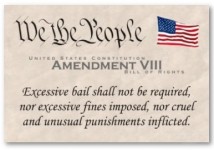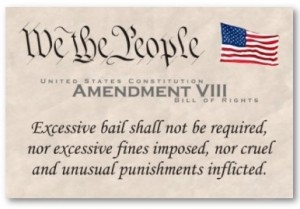
You get the call. It’s 2:00 in the morning, “Can you help me? I got arrested and I am at the jail. Can you please help me get out . . . now?!”
It’s a stressful situation. So let me help you understand some basic rights we all have and how you and a bail bondsman can help your family member, friend, relative or even sometimes, an employee access those rights.
Our Rights as U.S. Citizens

Don’t miss the video below.
First here are our rights:
- Presumption of innocence – more commonly said as “Innocent until proven guilty.” The concept goes way back in the history of most civilized nations. It can be traced back before Common Law to as far back as 6th Century Roman Law.
- 5th Amendment to the Constitution – No person shall be…deprived of life, liberty, or property, without due process of law…
- 6th Amendment – In all criminal prosecutions, the accused shall enjoy the right to a speedy and public trial…have the Assistance of Counsel for his defence.
- 8th Amendment – Excessive bail shall not be required,…nor cruel and unusual punishments inflicted.
This paragraph from The Free Dictionary tempers these ideas somewhat as we have come to use them in practice.
The presumption of innocence principle supports the practice of releasing criminal defendants from jail prior to trial. However, the government may detain some criminal defendants without bail through the end of trial. The Eighth Amendment to the U.S. Constitution states that excessive bail shall not be required, but it is widely accepted that governments have the right to detain through trial a defendant of a serious crime who is a flight risk or poses a danger to the public. In such cases the presumption of innocence is largely theoretical.
As a society, we need to balance the rights of individuals with the need for law, order and justice.

24/7 …Because you don’t want anyone you care about to stay in jail one minute longer than absolutely necessary!
Call Now: 804-370-0053
For justice to take place in our legal system, the accused must stand trial. But for our rights to
be protected, we usually can’t just lock up the accused until the trial as that would not allow them time to participate in their own defense. They might lose their jobs, their families, the support of their friends, etc. In those circumstances, it may also turn out to be “cruel and unusual punishment.” Particularly if the accused is later found to be “not guilty.” And it would certainly not follow the “presumption of innocence” principle.
So how can we make it probable that the accused will show up for trial, but allow them to be released from jail in the meantime?
Sometimes, if it is a first offense for the accused, if the accused is an upstanding member of the community with strong ties to it, he/she has family support, steady employment, and the crime is not severe, the judge may release the accused “O.R.” or on their Own Recognizance.
Most of the time though bail is required.
Bail is defined as:
Security, usually a sum of money, exchanged for the release of an arrested person as a guarantee of that person’s appearance for trial.
If the bail amount is low enough, the accused can ‘post’ it themselves, perhaps with help of family. The accused then has an incentive to show up for court until the case is concluded. At that time, the bail will be refunded to the accused.
The Bail Bondsman’s Important Role
Far more often than not, people can’t afford to post their own cash bail. And that’s where a bail bondsman can fill a very important role. He/she can post a bond for the accused and get them out – for a fee, usually somewhere between 10% to 15% of the amount set by the court.
Generally, the bail bondsman requires a third party co-signer, indemnitor or guarantor who additionally assumes responsibility for the defendant while they are out on bail and co-assumes financial liability to guarantee the full bond amount.
The beauty of the whole arrangement is that through the use of a bail bondsman, the courts get not just one, but three people promising that the defendant will appear, the defendant is joined by the bondsman and the cosigner. All three have much to lose if the defendant fails to appear.
Yet the defendant can be released for only the price of the bail bondman’s fee – which is much more affordable than the full bail and very much preferable to staying in jail!




